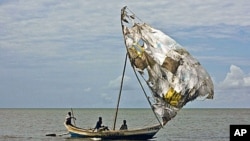In the Turkana area of northern Kenya, livestock numbers have dwindled drastically due to the drought. Livestock is the mainstay of the nomadic Turkana people, who are relying increasingly on food aid to survive. With the support of an aid agency, one community on the shores of Lake Turkana has integrated a non-traditional food into their rations to meet their protein needs. By sourcing fish locally, a thriving local market is also created, increasing the incomes of fishermen and fish traders and, thus, multiplying the benefits of food aid.
Foreign food aid has drawbacks
Meyen Nang’iro Eipa and his friends attend a function in the village of Kalokutonyag in the Turkana area of northern Kenya. They use small rocks to chip away at a hard, dry nut that they and others then attempt to tear with their teeth.
All of Eipa’s cattle have died in this drought and previous ones. For nomadic herders such as Eipa, livestock mean life: the source of a family’s food, income, and peace of mind. “My children do not have a reliable food source because of the drought," he noted. "We are relying on wild fruits to survive. When these wild fruits are finished, we no alternative other than to die.”
Eipa and his family receive some food aid, but he says it is not enough.
Food distribution points have been set up in locations all across the Turkana area. Aid groups and government personnel hand out rations of fortified porridge and other foods meant to prevent or treat the malnutrition that is skyrocketing as the drought rages on.
But dumping foreign food into a community has its drawbacks. The aid benefits only the relatively few people who receive it. Even then, recipients are pressured to share their rations with others who are hungry, as rations are handed out in bulk. Having to line up for food can also be a degrading experience.
But one community near Lake Turkana is turning to a food other than the traditional livestock for their source of protein. With the support of an aid agency, villagers have also found a way to multiply the benefits of food aid and deliver it in a dignified way.
Voucher aid program
On the shores of Lake Turkana, Peter Asaenyan returns from a morning of fishing, dragging his net to the shore.
He removes his catch from the nets and takes his fish to a shop in Nasechabuin village. Trader Peter Abwel purchases the fish, dries them under the hot sun, and stores them in his shop.
Food aid recipients come to Abwel’s shop with a voucher given to them by the aid agency Oxfam, which entitles them to receive some fish. Abwel then redeems the voucher for cash from the agency.
The project has created a ready market for fish in the village of Nasechabuin and area, whereas before the closest viable market was in the town of Kakuma more than two hours away.
Local fishermen benefit from project
Fisherman Peter Asaenyan says his income has increased because he no longer has to pay transportation and hotel costs to sell his fish in Kakuma. He explains that it has made a huge difference in his family’s life. “I can buy my children food and take them to school. When I went to Kakuma, I could stay there for one week waiting for the market. When I came back home, I would find my children sick and hungry," he said. "When I sell my fish here, I can see what problems are happening at home and manage those problems.”
Likewise, fish trader Peter Abwel says he saves money by selling his processed fish locally rather than in Kakuma and other places. He says the project has made his work easier and appreciates the training and help with licenses and loans that the project provides.
“I can get the fish directly from the fisherman in bulk. Before, I had to go to the lake, collect the fish, and transport them to another town to sell. I was experiencing a lot of hardships in transportation and licenses. Now I can sell the fish here,” Asaenyan explained.
Oxfam, making a difference
Joseph Akure is deputy program coordinator for Oxfam. He explains that standard supplementary food rations contain a protein source typically from pulses such as beans. He says substituting fish for plant protein makes the rations more nutritious and cuts down on firewood and water to boil the beans. Akure says it is also a departure from the way food aid is delivered.
“This is like a shop. You just walk in with your voucher, buy whatever you need, take it home, come back again when you need more. It brings in some dignity when you go in. It avoids issues of sharing, because you only get to take home what you need, say for a week,” he said.
Akure says he thinks the local market for fish will continue long after food distributions end in Nasechabuin and area, with the incomes of traders and fishermen continuing to be steady. He says other businesses are developing as a result.




